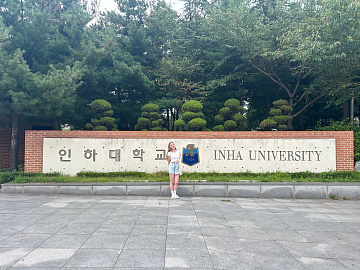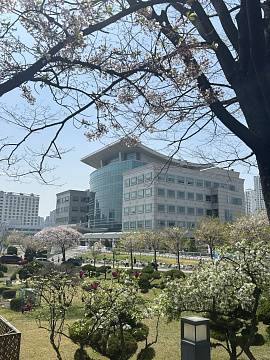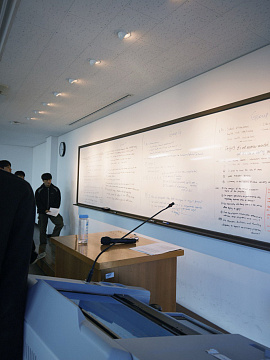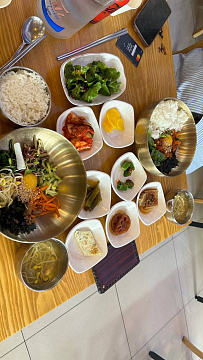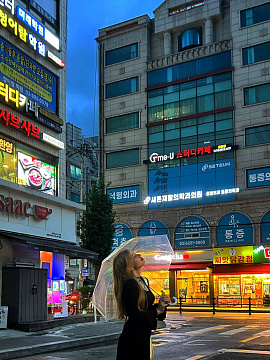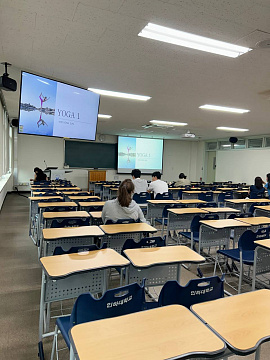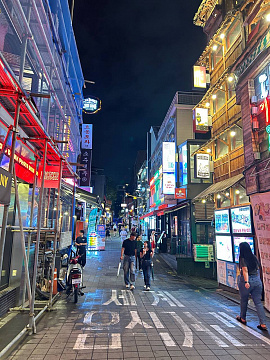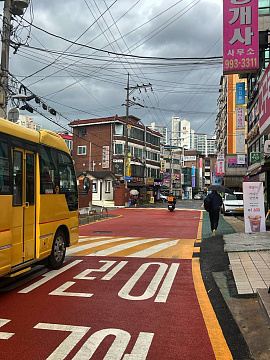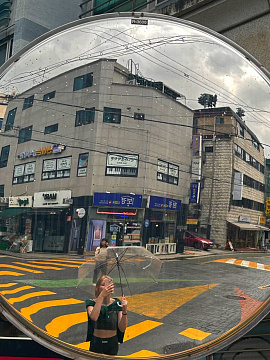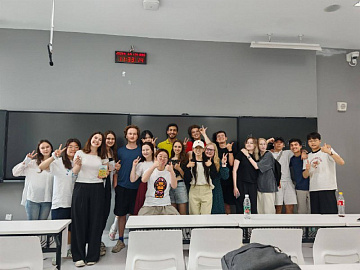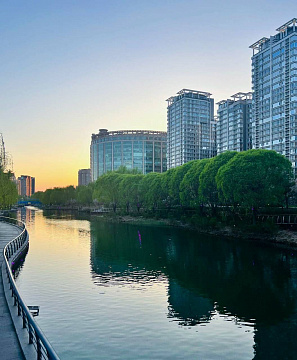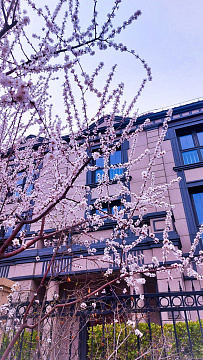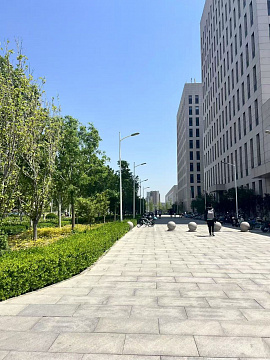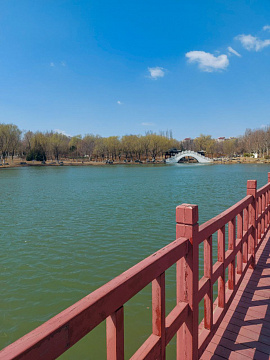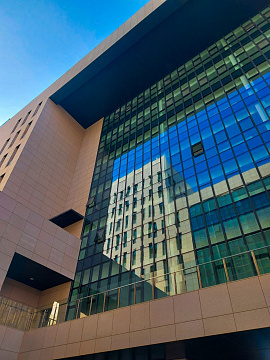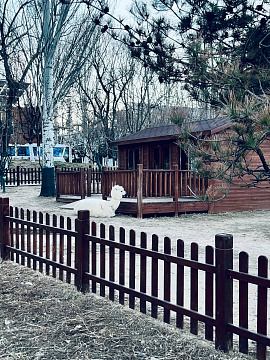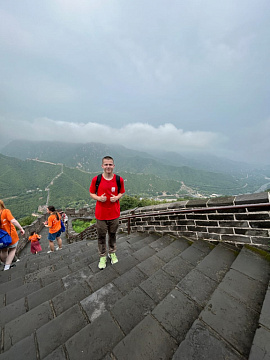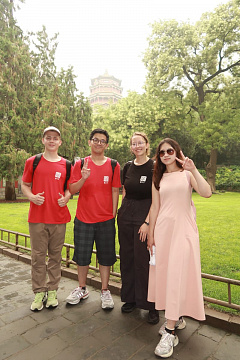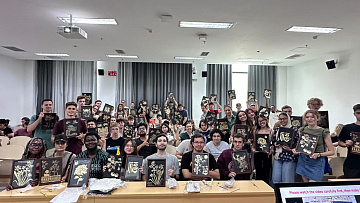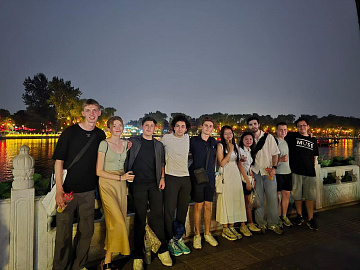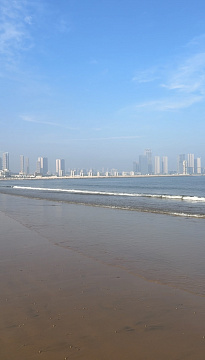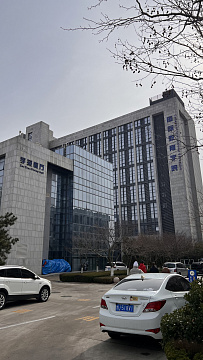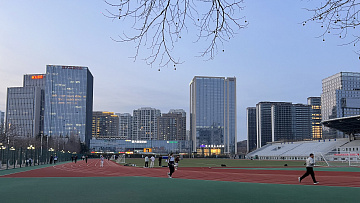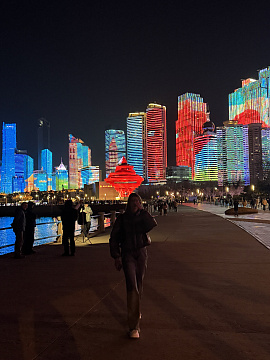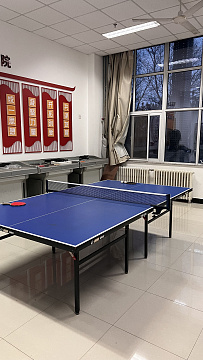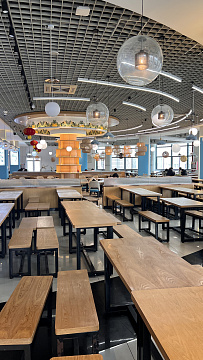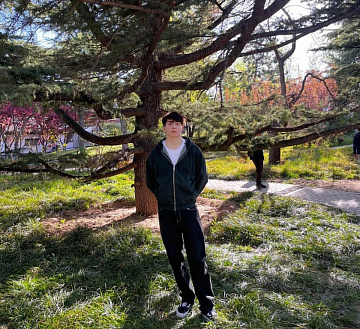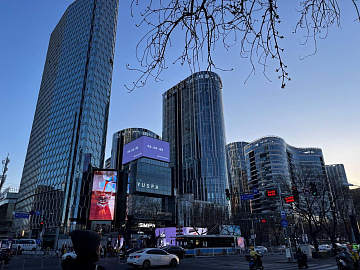
Back in the first semester, I realized how much I enjoyed the process of learning and personal growth, so I decided to extend my internship for a second semester. Undoubtedly, adapting to a new country is always challenging, but in South Korea, it proved to be significantly more difficult. However, this made me stronger and more confident.The first few weeks were especially tough: a new city, an unfamiliar educational system, and the language barrier were all sources of stress. I was afraid to speak English, participate in class discussions, and constantly doubted my knowledge. But over time, I adapted, and studying became much easier. The year I spent here exceeded all my expectations. This journey greatly broadened my horizons. I managed to overcome many fears, including the language barrier, and now I can confidently communicate in both English and Korean. Thanks to numerous group projects and presentations, my communication skills significantly improved. Moreover, I experienced a completely different approach to education: a different grading system, flexible learning formats (offline, online, hybrid), and a digitalized process (PDF lectures, electronic tests). This eliminated the need to take mechanical notes during three-hour lectures and allowed me to focus on understanding the material. The university atmosphere was especially inspiring — at times it felt like living in a romanticized K-drama: studying at a prestigious university, making friends fr om all over the world, traveling around the country, and unforgettable moments like cherry blossom season. I’m confident that this year has been a powerful push for my professional and personal growth. The experience not only strengthened my academic skills but also changed my perspective on education as a whole.
What difficulties did you face during the preparation for the internship? What advice would you give to future participants of academic mobility programs?
If I had to give advice to future academic mobility participants, it would probably make up a whole article—or maybe even a book! But based on my own experience, here are the most important points.
Main difficulties and how to overcome them:
Financial preparation – Save up as much money as possible before departure. Even if your budget seems well-planned, you’ll definitely want to explore new things on-site—travel, local food, cultural events. Studying is only part of the experience, and immersion in the country requires resources.
Academic coordination – It’s crucial to reach an agreement with your home university regarding the exam format in advance, especially if your university has strict policies (as was the case with my department – the Engineering Institute of Information and Computer Technologies, wh ere professors weren’t always accommodating). I had to fly back to Irkutsk between semesters to take my exams, which added stress and extra expenses.
Advice for future participants: Go for it! If you're unsure about going or not, the answer is almost always "yes." Many students don’t realize what opportunities they’re missing by passing up such programs. Even one semester (just four months!) can completely change your life — both professionally and personally.Try everything! Exchange study isn’t just about academics — it’s a new mindset, networking, travel, and stepping out of your comfort zone. The more actively you engage in the process, the more valuable the experience will be.
Describe the visa application process. Your advice for future participants of academic mobility programs.
The process of obtaining a student visa for South Korea went relatively smoothly for me, although I made a few mistakes that could have complicated things. The main issue was starting the paperwork too late, which forced me to rush everything. Nevertheless, to my surprise, the visa was approved just a few days after submission. Before submitting my documents, I was warned that I might be called for an interview at the consulate, which made me quite nervous. However, in practice, no interview was required, and the visa was issued without any additional questions. Based on my experience, here are some tips:Start preparing early:
- Carefully review the required documents listed on the embassy’s website
- Pay close attention to expiration dates of documents (e.g., the bank statement must be recent)
- Schedule your visa appointment well in advance to avoid delays
Be ready for a possible interview:
- Prepare clear answers about the purpose of your trip, your funding, and study program
- Be familiar with the host university and your major
- Stay calm — questions are usually formal
Double-check your paperwork:
- Make sure you have all the necessary translations and certifications
- Make copies of all original documents
- I recommend preparing additional proof of financial stability
- Apply 1.5–2 months before your planned departure
- Even if there are delays, stay calm — with a complete set of documents, your chances are high.
What difficulties did you face upon arrival at the host institution? Your advice to future participants of academic mobility programs.
The financial aspect also required attention. I was freelancing and getting paid in rubles, which created problems with currency exchange. The best solution was:
- bringing a sufficient amount in US dollars (easier to exchange at banks), - researching money transfer systems in advance (Hanpass, Zolotaya Korona, E9Pay).- Bank transactions in rubles often came with fees and delays.
Food was another challenge. Our dormitory didn’t have a kitchen, so at first, I spent quite a lot on meals. Later, I found more budget-friendly options: the university cafeteria, meal sets from supermarkets (Emart, Homeplus), and buffet restaurants with a fixed entrance fee. I recommend checking the housing conditions in advance and planning your food budget accordingly.Cultural adaptation was equally important. Some students, unprepared for local customs, felt frustrated. I had studied Korean traditions beforehand: the importance of punctuality, respect for elders, silence on public transport. This helped me avoid awkward situations. For example, I knew that tipping could be offensive and that loud conversations on the subway were frowned upon. Keep in mind that Koreans can be quite expressive and may exaggerate small issues. Health insurance deserves special attention. In the first semester (before receiving the ARC card), I used temporary insurance. When I stayed for the second semester, I signed up for local health insurance (NHIS). This is crucial: without coverage, even a basic doctor’s visit can be very expensive. This experience taught me how to quickly find solutions in unfamiliar environments. Despite the initial challenges, I never regretted joining the program. The key is to approach difficulties calmly and systematically — this will make your adaptation as smooth as possible.
Please indicate your expenses related to the internship abroad (visa costs, flight/train to destination, registration fees/taxes/deposits, health insurance/services, public transport, meals, accommodation). Any advice on reducing costs?
Visa – $80
Round-trip airfare – ~$670
Health insurance – ~$33
Foreign registration card fee (ARC) – ~$33
Meals – Varies by personal preference. A dish at a restaurant costs around $8, while in the cafeteria it’s around $3.50. Since there was no kitchen in the dorm, we mostly ate out.
Accommodation – ~$800
Laundry/drying in the dorm – ~$1
Mobile phone plan – ~$28

What difficulties did you have at the stages of preparation for the internship? What tips and recommendations can you give to future participants of the academic mobility program?
Preparing for an international internship comes with certain challenges, and the key difficulties at this stage were organizational aspects and linguistic uncertainty. The visa application and document collection required meticulous attention to detail and constant monitoring of changing requirements, which created significant pressure. At the same time, I felt anxious about whether my language skills would be sufficient—not only for everyday communication but also for professional tasks and understanding the cultural context of the country. My recommendations for future participants are as follows: start preparing your documents as early as possible and maintain a clear file with deadlines and requirements—this will reduce stress and help avoid mistakes. As for language, I advise focusing not on perfect mastery but on learning key phrases for daily and work situations. Most importantly, remain flexible and remember that the difficulties of preparation are entirely outweighed by the unique experience that awaits you.
Describe the process of obtaining a visa. Your advice for future participants of the academic mobility program?
The process begins with filling out an online application on the official website of the embassy or visa center of the destination country.
Key features:
· You must prepare scans of all documents in advance (passport, invitation letter, photo).
· The data must exactly match the information in the documents.
· After filling out the form, you will receive a unique application number (save it for tracking purposes).
· It is better to print out the application.
Waiting for the invitation and preparing documents:
Before submitting documents, you must:
· Receive an official invitation for document submission.
· Prepare a full set of documents according to the embassy’s requirements.
Document submission:
An in-person visit to the visa center includes:
· Submitting originals of all documents.
· Paying the visa fee (2,500 RUB).
The waiting period for visa issuance is about a week.
Advice for future academic mobility participants:
· Start the visa application process as early as possible to avoid unnecessary stress.
· Check the latest requirements on official websites.
· Print all confirmations and receipts.
· Keep copies of all submitted documents.
· Take into account national holidays of the destination country.
What difficulties did you encounter upon arrival at the host foreign organization? Your advice to future participants of the academic mobility program.
The main difficulties I encountered in the first few days:
1. The lack of internet and phone connection in the first few hours significantly complicated orientation and the ability to contact coordinators. This created a sense of disorientation in an unfamiliar city.
2. Not knowing wh ere to eat or buy groceries became a major daily challenge. In the first few days, I had to spend a lot of time searching for suitable canteens or affordable stores.
3. Difficulty remembering the locations of classrooms and academic buildings in a large campus. I was late to classes several times due to navigation issues within the complex building system.
4. Uncertainty about where to purchase daily necessities and drinking water. Local supermarkets were overflowing with products, but it was difficult to find specific essential items without knowledge of the language and local specifics.
5. Realizing that many items could have been purchased cheaper and faster online in advance. For example, adapters and basic household items could have been acquired more affordably and quickly.
My recommendations for future participants:
· Save offline maps of the city and campus on your phone.
· Ask your coordinator for an introductory tour of the campus on the very first day.
· Take a photo of the campus map and save it on your phone.
· Immediately find out where the student canteen and the nearest supermarket are located.
· On the first day, locate where to buy water and basic groceries.
· Learn about local food and goods delivery apps.
· Make a list of essential items for initial purchases.
· Find chats and groups of previous program participants.
· Don’t hesitate to ask for advice fr om more experienced students.
· Create a checklist based on the experiences of past interns.
Specify your expenses related to participation in an internship abroad (visa costs, cost of flight / travel to the place of internship, registration fees / taxes / deposits in the host organization, policy / medical services, if used, public transport, meals, accommodation. Your tips for cutting costs.
Main expenses during the internship:
The internship in China required careful budget planning. Visa expenses amounted to 2,500 RUB, including the consular fee and visa center services. The round-trip flight cost approximately 17,000 RUB—the price varied depending on the season and booking timing.
Upon arrival, additional expenses arose: a registration deposit of 100 CNY (refundable), a local SIM card with phone number and internet for 500 CNY, and study materials for approximately 200 CNY. Utilities, including electricity, amounted to about 100 CNY for a room of four people. Medical insurance for the entire internship period cost 400 CNY.
Daily expenses included transportation and food. A metro ride cost between 3 and 9 CNY one way, while a bus ride ranged from 2 to 4 CNY. Food expenses amounted to about 50 CNY per day with a reasonable approach to choosing dining options.
Practical tips for reducing expenses:
To cut transportation costs, I recommend finding out the schedule of free shuttle services in advance and planning trips accordingly. This helps avoid taxi expenses. For food, significant savings can be achieved by seeking out local canteens with affordable prices. It’s worth paying attention to places popular among students. For everyday purchases, I recommend using Chinese online stores like Taobao, wh ere many items can be bought cheaper than in physical stores.

In general impressions are positive. I’ve achieved success in Electronic Engineering. I’ve got new knowledge in IT area during the program.
Did you have any difficulties during the preparation for the program? Which advices and recommendations can you give to future participants of academic mobility program?
I didn’t have difficulties during preparation. I’d like to recommend taking care in advance about installation WeChat.
Describe the process of obtaining a visa. Give your advices for future participants of academic mobility program.
1. I filled out the questionnaire online. Then I printed the confirmation document.
2. I submitted the documents to The Consulate.
3. I paid for the visa at the bank by check from The Consulate.
4. I got the visa after presenting the payment receipt.
Did you have any difficulties in the first days at the host foreign organization? Give your advices for future participants of academic mobility program.
I had a problem during check-in. The lock in the door was broken. We got a new room quickly. As for advice, it is import to look all parts of a room, if there is a problem, you can ask an administration.
Can you present your expenses related to participation in the program abroad?
1. Visa: 2 500 rubles.
2. Deposit for the dormitory: 100 yuan.
3. Rent of bicycle (different costs): 1.5 yuan per 30 min; 1.5 yuan per 15 min.

What difficulties did you have at the stages of preparation for the internship? What tips and recommendations can you give to future participants of the academic mobility program?
The main difficulties at the preparation stage:
• Document processing – it is important to clarify the list of required papers and the deadlines for their submission in advance.
• Finding accommodation – it is better to contact the host university in advance and clarify the accommodation options.
Tips:
✔ Start preparing at least 3-4 months in advance.
✔ Check all the details with the program coordinators.
✔ Learn basic Chinese – it will greatly facilitate life.
Describe the process of obtaining a visa. Your advice for future participants of the academic mobility program.
For the exchange program, I applied for a student visa (X2). The process was as follows:
1. Received an invitation from the university.
2. Filled out a visa application form on the consulate website.
3. Prepared a package of documents (passport, photo, enrollment certificate, etc.).
4. Submitted the documents to the consulate.
Tips:
✔ Submit the documents in advance, as there may be delays.
✔ Check all the details in the invitation carefully.
✔ If you are traveling for a long time, find out about medical insurance.
What difficulties did you encounter upon arrival at the host foreign organization? Your advice to future participants of the academic mobility program.
The first days in China were not easy:
1. Language barrier – almost no one speaks English, and my Chinese was at an elementary level. Tip: download offline translators (Pleco, Google Translate) in advance.
2. Blocked messengers – WhatsApp, Instagram, Telegram do not work. Tip: Install a VPN before you arrive (Astrill, ExpressVPN).
3. SIM card issues – we arrived on Sunday and couldn’t get a SIM card until Monday. Tip: Buy a temporary tourist SIM card at the airport or use international roaming for the first few days.
Specify your expenses related to participation in an internship abroad (visa costs, cost of flight / travel to the place of internship, registration fees / taxes / deposits in the host organization, policy / medical services, if used, public transport, meals, accommodation. Your tips for cutting costs.
Visa: 2,500 RUB.
Flight: ~15,000 RUB.
Train: ~4,500 RUB.
Accommodation: ~ 8,400 RUB for 4 months
Meals: ~ 10,000–15,000 RUB/month. (If you eat in the canteens, campus food is inexpensive).
Transport: ~2,000–3,000 RUB/month (metro, taxi).
Communication: ~500–1,000 RUB/month.
How to save money:
Live in a university dormitory. Eat in canteens, not in restaurants. Use student discounts. Buy local SIM cards (China Mobile/Unicom).
An internship in China is an invaluable experience! Despite the initial difficulties, I have no regrets about the trip. The key is to prepare in advance, be open to new things, and not be afraid of the language barrier. If you have the opportunity to go, don't hesitate to try it!

What difficulties did you have at the stages of preparation for the internship? What tips and recommendations can you give to future participants of the academic mobility program?
The main challenges during preparation were collecting the necessary documents and managing the paperwork for the university and the visa. There were also some difficulties in coordinating schedules and communicating across time zones. My advice to future participants is to begin preparations as early as possible, double-check document requirements, and maintain regular contact with coordinators. Patience and persistence are key when dealing with international procedures.
Describe the process of obtaining a visa. Your advice for future participants of the academic mobility program.
The process of obtaining a Chinese visa was not very complicated, but it required attention to detail. I paid 1,500 RUB (approximately 117 CNY) and submitted documents including the invitation letter, passport copy, and travel plan. The procedure took about a week. My advice is to check visa requirements carefully, gather documents early, and be ready for possible changes. Booking an early appointment at the visa center helps avoid delays.
What difficulties did you encounter upon arrival at the host foreign organization? Your advice to future participants of the academic mobility program.
Upon arrival, adapting to a new environment and getting used to the local culture and communication styles was a bit of a challenge. However, university staff and fellow students were friendly and helpful, which made the transition much smoother. I recommend arriving a few days early to explore the area, familiarize yourself with public transport, and settle in calmly before the program starts.
Specify your expenses related to participation in an internship abroad. Your tips for cutting costs.
Here are my approximate expenses during the internship (converted to Chinese yuan, CNY):
• Visa: 117 CNY
• Daily expenses (30 days, approx. 700 RUB/day): 1,638 CNY
• Dormitory deposit: 500 CNY
Total: approximately 2,255 CNY
Tips for cutting costs: Use student dormitories rather than off-campus housing, eat at campus cafeterias, and rely on public transportation. It’s also smart to set a daily spending limit and plan your budget in advance.


